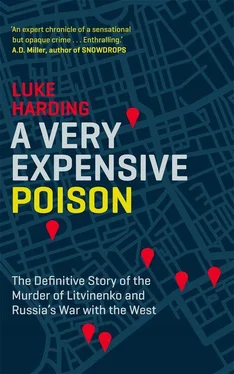‘I swallowed several times but it was a green tea with no sugar and it was already cold by the way. I didn’t like it for some reason, well, almost cold tea with no sugar, and I didn’t drink it any more. Maybe in total I swallowed three or four times.’ Litvinenko said he didn’t finish the cup.
And then:
DI HYATT: The pot with the tea in it was already there?
LITVINENKO: Yes.
DI HYATT: How many mugs were on the table when you came in?
LITVINENKO: I think three or four cups.
DI HYATT: And did Andrei drink any more from the pot in your presence?
LITVINENKO: No.
DI HYATT: OK, and what happened next?
LITVINENKO: Then he said Vadim [Kovtun] is coming here now … either Vadim or Volodia, I can’t remember. I saw him for the second time in my life.
DI HYATT: What happened next?
LITVINENKO: Next Volodia took a place at the table on my side, across from Andrei.
The three men discussed their meeting scheduled for the following day at the private security firm Global Risk. The bar was crowded, with ‘lots of people’, Litvinenko said. He felt a strong antipathy towards Kovtun. It was just their second encounter. There was something strange about him, Litvinenko thought – as if he were in the midst of some personal torment.
LITVINENKO: Volodia was – seemed to be – very depressed, as if he was very much hungover. He apologised. He said that he hadn’t slept for the whole night, that he had just flown in from Hamburg and he wanted to sleep very much and he couldn’t stand it any more. But I think he is either an alcoholic or a drug addict. He is a very unpleasant type.
DI HYATT: Volodia [Kovtun], how did he know to come to the table? Did Andrei contact him and ask him to come and join you, or was there already an arrangement for him to join you?
LITVINENKO: No … he [Kovtun], I think he knew in advance. Even possibly they had been sitting before this and maybe he went up to his room.
DI HYATT: Just going back to when you had some tea, you didn’t ask the waiter for a drink. It was mentioned that there was some tea left. How insistent was Andrei that you have a drink, or was he indifferent? Was he saying, ‘Go on, go on, have some’? Or didn’t he care?
LITVINENKO: He said it like that, you know, ‘If you would like something, order something for yourself, but we’re going to be leaving soon. If, if you want some tea, then there is some left here, you can have some of this …’ I could have ordered a drink myself, but he kind of presented in such a way that it’s not really need to order. I don’t like when people pay for me but in such an expensive hotel, forgive me, I don’t have enough money to pay for that.
DI HYATT: Did you drink any of the tea in the presence of Volodia [Kovtun]?
LITVINENKO: No, I drank the tea only when Andrei was sitting opposite me. In Volodia’s presence, I wasn’t drinking it … I didn’t like that tea.
DI HYATT: And after you drank from that pot, did Andrei or Volodia drink anything from that pot?
LITVINENKO: No, definitely. Later on, when I left the hotel, I was thinking there was something strange. I had been feeling all the time, I knew that they wanted to kill me.
There is no evidence to say whether it was Kovtun – the former waiter, good at mixing drinks – or Lugovoi who put radioactive polonium in the teapot. From Litvinenko’s testimony, it’s clear this was a joint criminal enterprise. Lugovoi would subsequently explain that he couldn’t recall what drinks he’d ordered in the Pine Bar. And that Litvinenko had insisted upon their meeting, to which he’d reluctantly assented.
Subsequently, police tracked down Lugovoi’s Pine Bar till receipt. Lugovoi was a man who murdered with a certain breezy style.
The order was:
3 Teas
3 Gordon’s gin
3 Tonics
1 Champagne cocktail
1 Romeo and Julieta cigar, no 1
1 Gordon’s gin
The tea came to £11.25; the total bill £70.60. Lugovoi paid on his credit card.
Andrade, the man who brought the tea, was from Brentwood in Essex. He’d worked at the Pine Bar since 1981, and was in his late sixties by 2006; his slicked-back grey hair recalled an earlier, more glamorous era. He would retire two years later. Over the years he had served many celebrities. They included the actor Sean Connery, probably the greatest James Bond, and the man who owned the 007 spy franchise, film producer Cubby Broccoli, whose second Bond movie starring Connery was From Russia With Love.
It was a Wednesday. Andrade was working his regular 11 a.m.–7.30 p.m. shift. The bar was extremely busy, he said; there was a property auction going on in the ballroom. Several Russian clients had come to the hotel that week for the football. He was serving drinks, while his ‘very professional’ younger colleague Jacob worked from behind the bar. Lugovoi walked in. He asked for a Havana cigar, and said he would be ‘coming in shortly for drinks’, Andrade said. The barman said he’d add Lugovoi’s cigar to his bill.
Half an hour later, Lugovoi returned, took a seat at table one, strategically positioned in the corner with a clear view of the entrance, and ordered three green teas with fresh lemon and honey. Jacob took a teapot and cups from a stack next to the bar’s Giga coffee machine. Andrade said he delivered the tea to the table but didn’t pour – customers generally preferred to pour themselves, he explained.
Almost immediately, Lugovoi called him back and demanded more honey. Over the next half an hour Norberto said he was shuttling ‘very rapidly back and forth’ between the bar and table one – the Russians were a demanding party and called him back for gin, then ‘a couple of minutes later’ asked for champagne.
At the time, his impression of the men from Moscow was favourable: ‘They were extremely well-behaved and well-dressed gentlemen.’ Andrade said he didn’t notice Litvinenko join Lugovoi at the table. But he did recognise Lugovoi and Kovtun. He said he’d seen them in the bar on a previous occasion.
By this point, Lugovoi and Kovtun must have concluded that their poisoning operation had worked. Litvinenko had drunk the green tea. Not much, admittedly. But, he had drunk. Surely, enough?
Later, in fact, it was found that Litvinenko had an astonishing 26.5 micrograms of polonium in his bloodstream. Less than one microgram would have been enough to kill him (estimates suggest that one gram alone could kill 50 million and sicken another 50 million). His exposure to radiation in this dose was approximately 175,000 times greater than that given off in an X-ray.
The meeting lasted twenty minutes. Then, Litvinenko told police, a tall Russian in a dark cardigan materialised at the bar. It was Sokolenko. Sokolenko ‘said something’ to Lugovoi, who replied: ‘Yes, yes, all right’ and ‘Go on, I will speak to you later.’
Lugovoi gazed at his watch. He said he was expecting his wife, Svetlana. Mrs Lugovaya (Russian surnames have different feminine versions) appeared in the foyer and, as if on cue, waved her hand, and mouthed: ‘Let’s go, let’s go.’ Lugovoi got up to greet her, and left Litvinenko and Kovtun sitting together at the table.
There was one final, scarcely believable scene. According to Litvinenko, Lugovoi came back to the Pine Bar accompanied by his eight-year-old son Igor. Another guest, Duncan Cunningham, noticed Igor in the hotel, holding a bag from the Hamley’s toy store in London, and looking uninterested, fed up and bored by dull adult company.
Lugovoi introduced his small son to Litvinenko. He said to Igor: ‘This is Uncle Sasha, shake his hand.’
Igor was a good boy. He obediently shook Litvinenko’s hand, the same hand that by now was pulsing with radiation. When police examined Litivnenko’s denim jacket they found massive contamination on the sleeve – Litvinenko had picked up and drunk the tea with his right hand. The party plus Litvinenko exited the bar. The Lugovoi family and Sokolenko went off to the match. Kovtun declined to go, declaring: ‘I’m very tired, I want to sleep.’
Читать дальше












